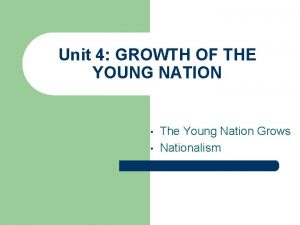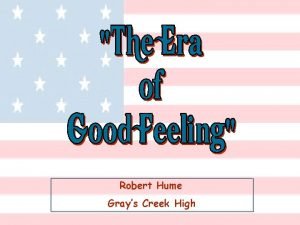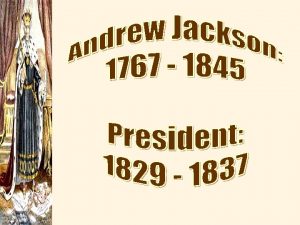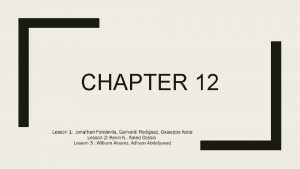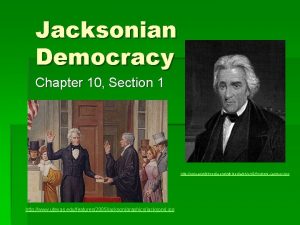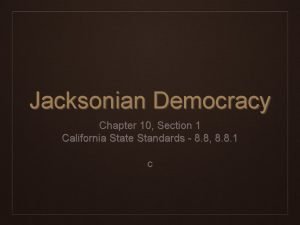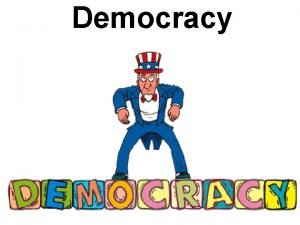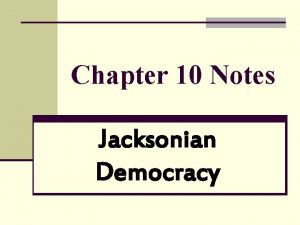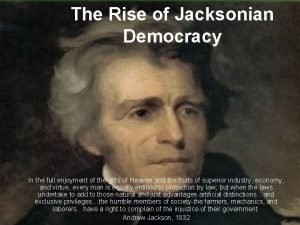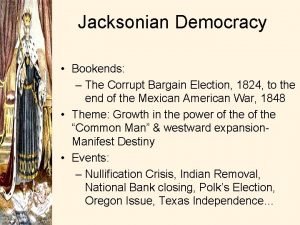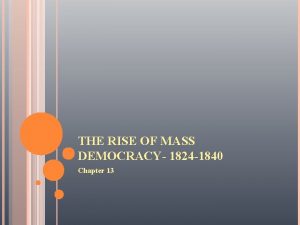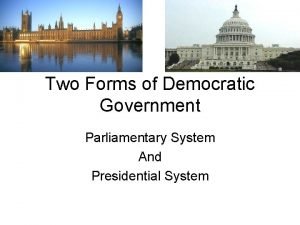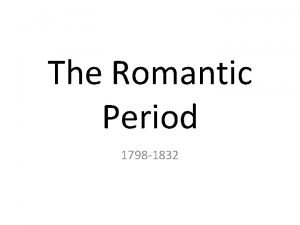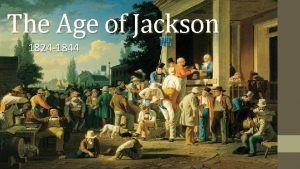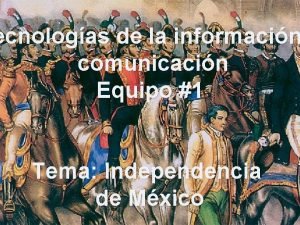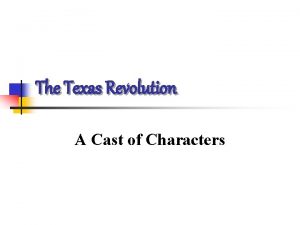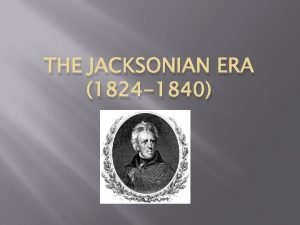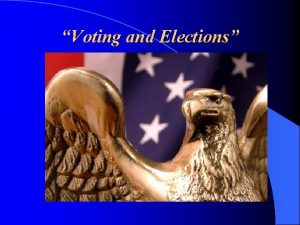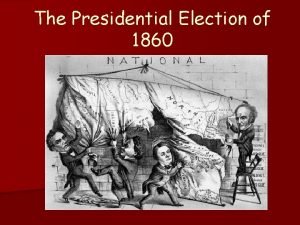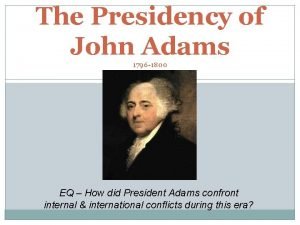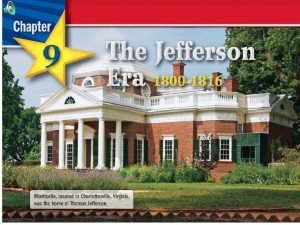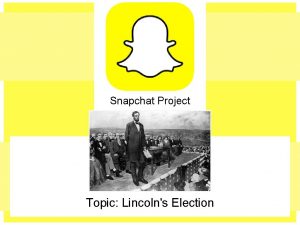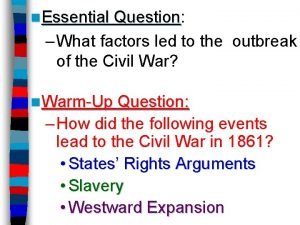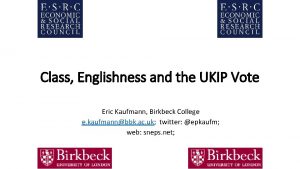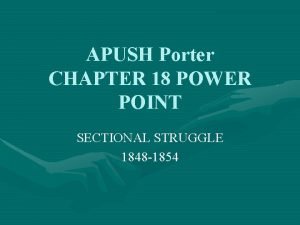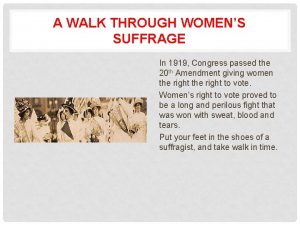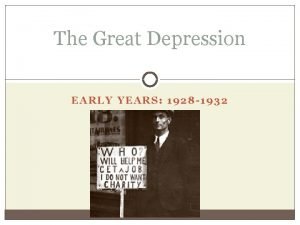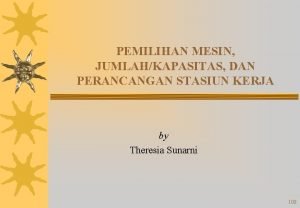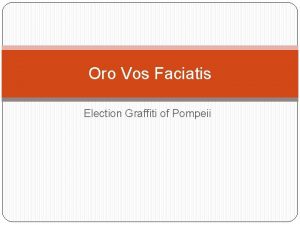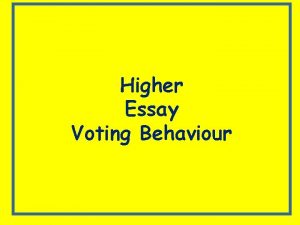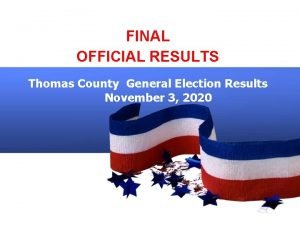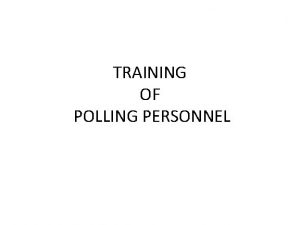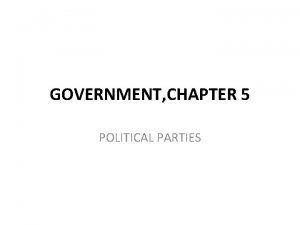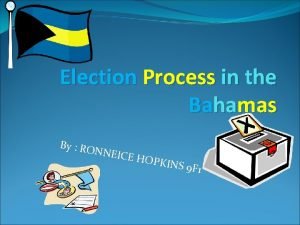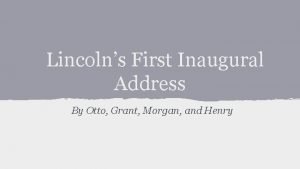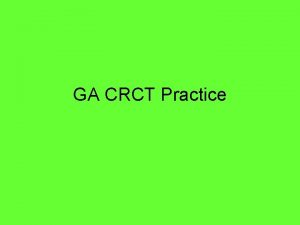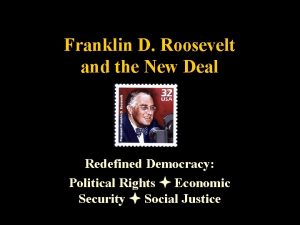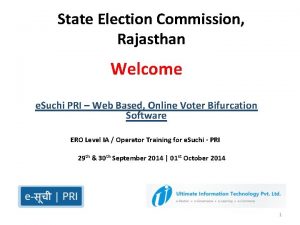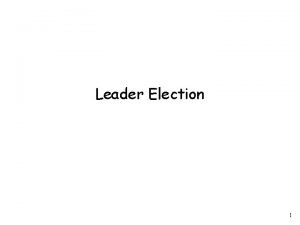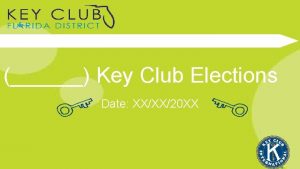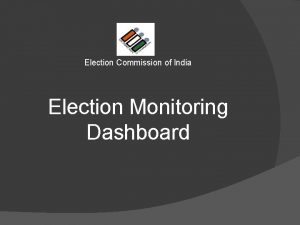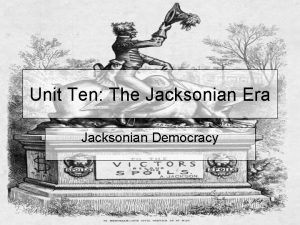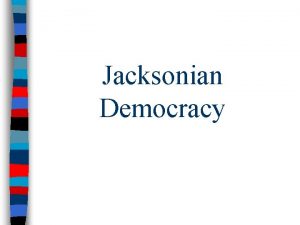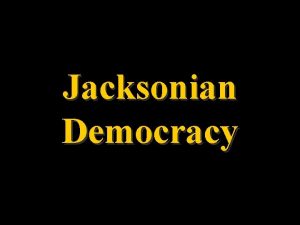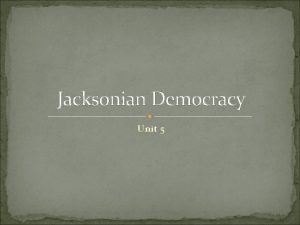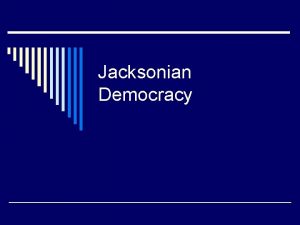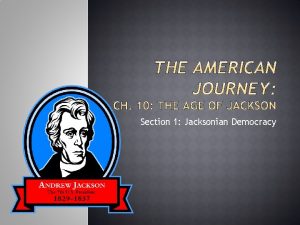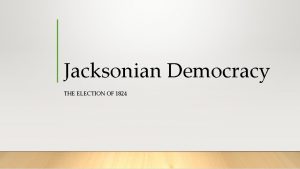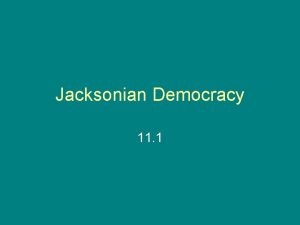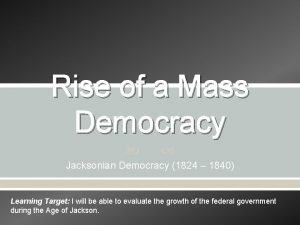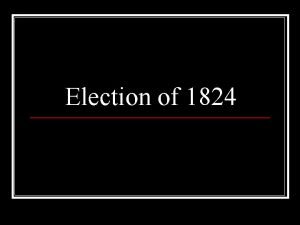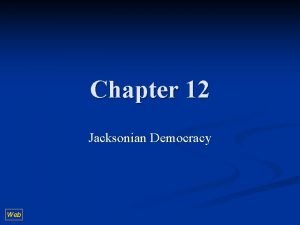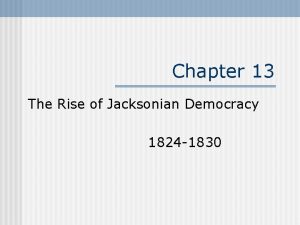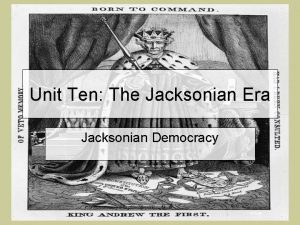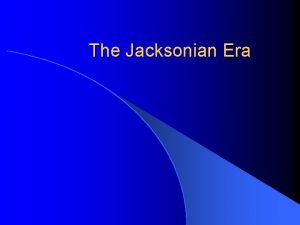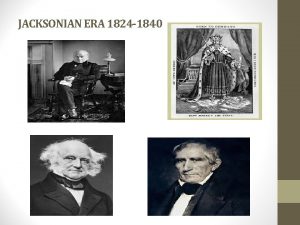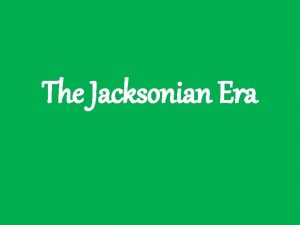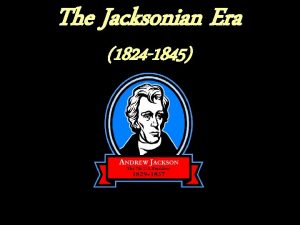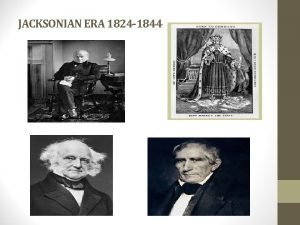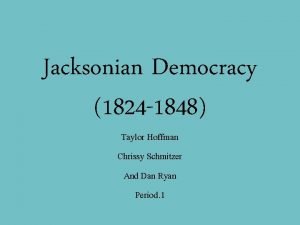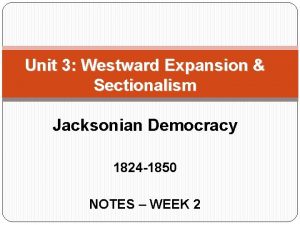Jacksonian Democracy Chapter 10 The Election of 1824



















![Turnout 57. 6%[1] Andrew Jackson John Q. Adams Party Democratic National Republican Home state Turnout 57. 6%[1] Andrew Jackson John Q. Adams Party Democratic National Republican Home state](https://slidetodoc.com/presentation_image_h2/74ac091fcaccf4290dcc80478179b836/image-20.jpg)


































- Slides: 54

Jacksonian Democracy Chapter 10

The Election of 1824 n James Monroe decided not to seek a third term as president. n There was only one political party. n Four candidates all from the Republican Party ran for president n Three of these were “favorite son” candidates meaning they received backing from their home state rather than the National party

Election of 1824…The candidates n William Crawford …nominated by the Republican Party …Congressman from Georgia…his poor health weakened him as a candidate n Henry Clay from Kentucky…Speaker of the House. . . The American System

Andrew Jackson. . war John Quincy Adams… hero…not a son of the 2 nd politician…the common Pres…Monroe’s man Secretary of State…support from merchants in the Northeast

Election results

Election Results n 12 th Amendment…when no candidate receives a MAJORITY of electoral college votes, the House of Representatives selects the next president from the top three candidates. Each state has one vote. n Top 3…Jackson, Adams, Crawford

The “Corrupt Bargain” n While the House was preparing to vote on the next president, Clay met with Adams. n Clay agreed to use his influence as Speaker of the House to get Adams elected. n In return, Clay wanted to be the next Secretary of State. This office was the traditional stepping stone to the presidency.

PRESIDENT VICE –PRESIDENT SECRETARY OF STATE George Washington John Adams Thomas Jefferson T. Pickering/J. Thomas Jefferson A. Burr/G. Clinton James Madison G. Clinton/E. Gerry James Monroe Daniel Tompkins John Quincy Adams ? ? ? ?

The “Corrupt Bargain” With Clays help, Adams was elected president n Jackson’s supporters were outraged by this corrupt bargain between Adams and Clay. n House Vote Jackson 7 Adams 13 Crawford 4 Clay -n

Adams’ Presidency n The corrupt bargain cast a shadow over the Adam’s presidency. n Adams wanted a stronger navy and government funds for scientific expeditions. n Most people desired a smaller role for the federal government and Congress turned down most of Adams’ proposals

Jacksonian Democracy Chapter 10, Section 1

Expansion of Democracy EQ: Why was Jackson’s presidency more representative of average citizens? America was changing fast in the early 1800’s - In the North, small family-owned shops were being replaced by large-scale factories. - In the South, small scale farms gave way to large cotton plantations owned by wealthy white people and worked by enslaved Africans -

Expansion of Democracy n Wealth seemed to be concentrating into fewer hands. n Many “ordinary” Americans felt left behind n These same ordinary Americans felt that their government was working to help build the power of the business owners. n The result was a belief that the wealthy were tightening their grip on power in the US.

Jackson Runs for President again! n Hoping for change, small farmers, frontier settlers, urban workers, and slave-holders rallied behind the reform-minded Jackson. n They believed AJ would defend the rights of the common man.

Expansion of Democracy n During AJ’s popularity, many democratic reforms were made (Some states changed voting qualifications to grant more white males suffrage; nominating conventions were used to chose party candidates—as opposed to party leaders)

The Election of 1828 n By the election of 1828, the Republicans had divided into two separate parties. n The Democratic-Republicans who supported Andrew Jackson (favored states rights, mistrusted stong federal government; frontier, immigrants, laborers) n The National Republicans who supported John Q. Adams (internal improvements, national bank; merchants and farmers)

The campaign (1828) n Both parties tried to ruin the reputation of the other candidates with insults (mudslinging) n The D-R’s accused Adams of being out of touch with and betraying the people n The N-R’s created a vicious campaign song which played on some embarrassing incidents in Jackson’s life (executing soldiers, etc) and called AJ crude, hottempered and ill-equipped to be president.

New Ways of Campaigning n Mudslinging was not the only new element in political campaigns. n Slogans, rallies, buttons and events such as barbecues were introduced to arouse enthusiasm for candidates.

1828 election results… n Jackson and John C. Calhoun (Adams’ VP who switched sides and became AJ’s VP) won in a landslide (overwhelming margin) n AJ received support from the frontier and the South
![Turnout 57 61 Andrew Jackson John Q Adams Party Democratic National Republican Home state Turnout 57. 6%[1] Andrew Jackson John Q. Adams Party Democratic National Republican Home state](https://slidetodoc.com/presentation_image_h2/74ac091fcaccf4290dcc80478179b836/image-20.jpg)
Turnout 57. 6%[1] Andrew Jackson John Q. Adams Party Democratic National Republican Home state Tennessee Massachus etts Running mate John C. Calhoun Richard Rush Electoral vote 178 83 States carried 15 9 Popular vote 642, 553 500, 897 55. 9% 43. 7% Nominee Percentage

Jackson as President n AJ was everything most Americans admired– a patriot, a self-made man, and a war hero. n On March 4, 1829 thousands of ordinary Americans jammed the nation’s capital to hear the AJ inaugural address. n Afterwards they jammed into the White House…chaos ensued

“Old Hickory” n born in a log cabin n His parents, poor farmers, died before he turned 15 n As a teenager, AJ fought in the American Revolution n Elected to Congress before the age of 30 n defeated the Creek Indians (Horseshoe Bend) and the British at New Orleans

AJ’s supporters n Small farmers n Craft workers n others left out of the expanding economy n AJ’s popularity with the “common man” changed politics in Washington, D. C.

New Voters n n n AJ promised “equal protection and equal benefits for all Americans (white Americans) did away with the requirement of owning property to be able to vote 1824 (26. 9%)… 1828 57. 6%. . . 1840 (80+%) sharecroppers, factory workers, and others women, African-Americans, and Native Americans still denied suffrage (the right to vote)

The Spoils System n Democrats wanted to open up the government to people from all walks of life n They distrusted bureaucracies (nonelected officials carry out laws) n Jackson fired many federal workers and replaced them with his supporters. n “to the victor goes the spoils”

Jackson’s “Kitchen” Cabinet n Secretary of State Martin Van Buren was one of Jackson’s strongest allies in his official cabinet. n President Jackson also relied heavily on his KITCHEN CABINET, an informal group of trusted advisors who sometimes met in the White House kitchen.

Jackson’s Administration Chapter 10, Section 2

SECTIONAL DIFFERENCES INCREASE- The North n Economy based on trade and manufacturing n Supported tariffs because tariffs help them compete with British factories n Opposed sale of public land at cheap prices…encouraged laborers to move West and out of factory towns

Sectional Differences. The South n Economy based on agriculture. Mostly cash crops (tobacco and cotton). A large portion was sold to foreign nations. n Against tariffs (bought imported manufactured goods; foreign countries imposed their own tariffs on American products) n Relied on enslaved Africans for labor

Sectional Differences. The West n The economy was still emerging n Favored policies that boosted farming and encouraged settlement, n Mostly farmers, they grew a variety of crops. n Highest priority: cheap land internal improvements

The Tariff Debate n 1828 (before AJ’s election)---very high tariff (tax on imported goods) passed n Like it…Merchants, northeast n Hated it… mostly Southerners…called it the Tariff of Abominations (an abomination is a hateful thing)

The Nullification Crisis n Southern politicians and plantation owners took action. n SC just beginning to recover from an economic depression and previous tariffs n talk of secession

The Nullification Crisis Calhoun drafted the South Carolina Exposition and Protest, an important states rights argument n State power> federal power. Federal government should not favor one state or region over another. n VP John C. Calhoun argued that a state had a right to nullify (cancel or reject) a federal law it considered to be against the state interests or unconstitutional n VP

The Nullification Crisis n Calhoun’s theory was controversial. Many of its challengers were from the North who had benefited from tariffs. They believed that the American people made up the Union, not individual states. n Although he did not put his name on his Exposition and Protest, Calhoun resigned the V-P. He was elected to the Senate where he continued his nullification argument

The Hayne-Webster Debate n Calhoun’s position put the power of the Supreme Court in question. n Intense debate on the Senate floor over states rights n Robert Y. Hayne (SC) argued that nullification gave states a legal way to protest federal legislation. n Daniel Webster (NH) argued that the welfare of the nation should not be overridden by individual states.

SC Nullification Act n Even though lower tariffs were passed by Congress in 1832, Southerners remained angry n SC took it one step further and passed the Nullification Act declaring that it would not pay the “illegal” tariffs of 1828 and 1832. n SC legislature threatened to secede if the federal government tried to interfere and voted to form its own army.

AJ’s Force Bill n To make sure the South would accept federal law, AJ had Congress pass the Force Bill n The Force Bill allowed the President to use the military to enforce acts of Congress n Jackson sent US Navy ships into Charleston harbor and even talked of hanging Calhoun n No other Southern states supported SC

“Mr. Compromise” to the rescue n Henry Clay sponsored a compromise bill in Congress that would gradually lower the tariff over several years. n Jackson supported this compromise but…

South Carolina Response n SC accepted the new compromise bill n To show they had not been defeated the SC legislature voted to nullify the Force Act. n SC claimed victory n LESSON LEARNED- the federal government would not allow a state to go its own way without a fight

Jackson Attacks the Bank WHAT WAS THE BANK OF THE UNITED STATES? -The 2 nd Bank of the U. S. was chartered in 1816 for 20 years -Acted as the Federal governments financial agent -Held fed. Deposits, transferred fed. Funds between states -Any payments or receipts involving the fed. Gov’t -Issued bank notes or paper currency -Bank was 80% privately owned -Operators of the Bank were supervised by Congress and the President

Opposition to the Bank n Many states, particularly in the South, opposed the Bank n Believed that it only benefited wealthy n Jackson questioned the legality of the Bank (unconstitutional extension of Congress’ power) n Jackson thought the states should control the banking system

Mc. Culloch vs. Maryland n Maryland tried to pass a tax that would limit the Banks operations. n James Mc. Culloch, cashier of the Bank’s branch in Maryland refused to pay the tax n Maryland took him to court…all the way to the Supreme Court. n The Supreme Court ruled that the national bank WAS CONSTITUTIONAL.

The Bank and the election of 1832 n After the Supreme Court victory, Nicholas Biddle (President of the Bank), Henry Clay, and Daniel Webster saw an opportunity to use Jackson’s position on the Bank against him in his re-election bid n Biddle decided to push the re-chartering of the Bank 4 years ahead of schedule. n Biddle knew that Jackson’s hatred of the Bank would cause him to veto the bill.

The Bank of the US and the election of 1832 n Jackson promptly vetoed the re-charter as expected. n Henry Clay received the National Republican nomination and the Bank became the central issue in the presidential campaign. n Clay (and Biddle/Webster) hoped that the Bank was so popular that Jackson’s hatred of it would cause AJ to lose the election.

The Election of 1832 All 286 electoral votes of the Electoral College 144 electoral votes needed to win Turnout Nominee 55. 4% [1] Andrew Jackson Henry Clay William Wirt Party Democratic National Republican Anti-Masonic Home state Tennessee Kentucky Maryland Running mate Martin Van Buren John Sargeant Amos Elmaker Electoral vote 219 49 7 States carried 16 6 1 Popular vote 701, 780 484, 205 100, 715 54. 7% 36. 9% Percentage 7. 8% Presidential election results map. Blue denotes states won by Jackson and Van Buren or Wilkins, light yellow denotes those won by Clay/Sergeant, green denotes those won by Floyd/Lee, and orange denotes those won by Wirt/Ellmaker. Numbers indicate the number of electoral votes allotted to each state. Clay/Biddle/Webster were WRONG! n They miscalculated the popularity of the bank and Clay lost the election (#2) n

JACKSON KILLS THE BANK n Congress could not over-ride AJ’s veto of the charter. n Jackson acted swiftly. He removing most of the US $$$ into smaller state banks. n These banks used the funds to offer easy credit terms to land purchasers. n Helped expansion in the West but led to inflation

ELECTION OF 1836 n Although he was still very popular, AJ decided not to seek a 3 rd term. n Democrats nominated VP, Martin Van Buren (NY, and AJ’s hand-picked successor) for president n The WHIGS (an anti-Jackson party formed in 1834) ran 4 candidates against MVB

n n n RESULTS: MVB 170/51%/15 WHH 73/37%/7 White 26/10%/2 DW 14/3%/1 Magnum 11/%/1

n. A PANIC of 1837 severe economic depression n Text says that AJ’s banking policies and his attempt to curb inflation contributed to the Panic. n Profits, prices, wages n Unemployment (25%) n Out of 850 banks in the US: 343 closed entirely, 62 failed partially n Lasted about 6 yrs.

Election of 1840 n In the middle of a severe economic depression MVB ran for re-election n This time the Whigs ran one candidate, William Henry Harrison and John Tyler for VP (Tippecanoe and Tyler, too!) n Henry Clay and Gen. Winfield Scott also sought the Whig candidacy but failed to get the nomination.

The Campaign In the wake of the Panic of 1837, MVB was not very popular n The Whigs ran Harrison as a war hero and a man of the people. He became known as “The Log Cabin Candidate”. They depicted MVB as a wealthy snob living in luxury as the publics expense and out of touch with the common man. n Actually, WHH was from a family of wealthy planters and MVB father was a tavern keeper. n


The Campaign n The Democrats and MVB depicted WHH as too old and senile to be president (He was 68). Often referring to him as “Granny” n The Whigs strategy was to not talk about issues but to focus on MVB’s failed economic policies. n First presidential campaign in which a candidate (WHH) actively hit the campaign trail.

All 294 electoral votes of the Electoral College 148 electoral votes needed to win Turnout Nominee 80. 2%[1] William H. Harrison Martin Van Buren Party Whig Democratic Home state Ohio New York Running mate John Tyler none Electoral vote 234 60 States carried 19 7 1, 275, 390 1, 128, 854 52. 9% 46. 8% Popular vote Percentage
 Martin van buren political party
Martin van buren political party Election of 1824
Election of 1824 Was andrew jackson a president
Was andrew jackson a president Chapter 12 lesson 1 jacksonian democracy
Chapter 12 lesson 1 jacksonian democracy Chapter 10 section 1 jacksonian democracy
Chapter 10 section 1 jacksonian democracy Chapter 10 section 1 jacksonian democracy
Chapter 10 section 1 jacksonian democracy Hyper pluralism definition
Hyper pluralism definition What is jacksonian democracy? *
What is jacksonian democracy? * What is the jacksonian democracy
What is the jacksonian democracy Jacksonian democracy
Jacksonian democracy Corrupt bargain political cartoon
Corrupt bargain political cartoon Maysville veto
Maysville veto Presidential republic
Presidential republic The romantic age (1798 to 1824)
The romantic age (1798 to 1824) Accenture delivery suite(ads)?
Accenture delivery suite(ads)? Guided reading & analysis: the age of jackson, 1824-1844
Guided reading & analysis: the age of jackson, 1824-1844 Constituição 1824
Constituição 1824 The romantic age (1798 to 1824)
The romantic age (1798 to 1824) Avolida
Avolida Mexican constitution of 1824
Mexican constitution of 1824 The age of jackson 1824-1844
The age of jackson 1824-1844 Mexican federal constitution of 1824
Mexican federal constitution of 1824 The jacksonian austin
The jacksonian austin Cobra election form sample
Cobra election form sample Brainpop political parties
Brainpop political parties Definition
Definition What measures were contained in the alien and sedition acts
What measures were contained in the alien and sedition acts The election of 1800 showed that
The election of 1800 showed that Lincolns election date
Lincolns election date Abraham lincoln's election
Abraham lincoln's election Lincolns election
Lincolns election British election study
British election study Chapter 18 apush
Chapter 18 apush Election day political cartoon
Election day political cartoon 1796 election
1796 election 1932 presidential election
1932 presidential election 1932 presidential election
1932 presidential election Electoral machine
Electoral machine Marcus vesonius primus
Marcus vesonius primus What factors affect voter behavior
What factors affect voter behavior Duties of polling officer in election 2014
Duties of polling officer in election 2014 Thomas county election results
Thomas county election results How to write duty slip certificate
How to write duty slip certificate Economic protest parties definition
Economic protest parties definition George caleb bingham the county election
George caleb bingham the county election Election process in the bahamas
Election process in the bahamas 1960 election
1960 election John breckinridge opinion on slavery
John breckinridge opinion on slavery Which statement best describes apartheid?
Which statement best describes apartheid? Tn dams
Tn dams Clarity election night reporting
Clarity election night reporting E-suchi
E-suchi Hirschberg sinclair algorithm
Hirschberg sinclair algorithm Key club caucus questions
Key club caucus questions Election monitoring dashboard
Election monitoring dashboard
